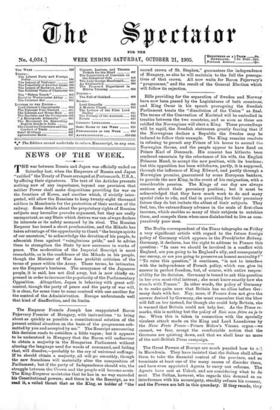T HE war between Russia and Japan was officially ended on
Saturday last, when the Emperors of Russia and Japan "ratified" the Treaty of Peace arranged at Portsmouth, U.S.A., by affixing their signatures. The text of the Articles presents nothing new of any importance, beyond one provision that neither Power shall make dispositions providing for war on the frontiers of Korea, and another which, if strictly inter- preted; will allow the Russians to keep twenty-eight thousand soldiers in Manchuria for the protection of their section of the railway. Some details about the proprietary rights of Russian subjects may hereafter provoke argument, but they are really unimportant, as any State which desires war can always declare its interests or its safety menaced by its rival. The Russian Emperor has issued a short proclamation, and the Mikado has taken advantage of the opportunity to thank "the benign spirits of our ancestors," to acknowledge the devotion of his people, to admonish them against "vainglorious pride," and to advise them to strengthen the State by new successes in works of peace. The moderation of the Imperial Rescript is most remarkable, as is the confidence of the Mikado in his people, though the Minister of War does prohibit criticism of the terms of peace within the Army. Those terms, he intimates, are the Emperor's business. The annoyance of the Japanese people, it is said, has not died away, but is now chiefly ex- pressed in order to increase the popularity of the Parliamentary Opposition. Altogether, Japan is behaving with great self. control, though the party of peace and the party of war will, it is clear, for some time to come contend with one another for the control of the Administration. Europe understands well that kind of disaffection, and its limits.














































